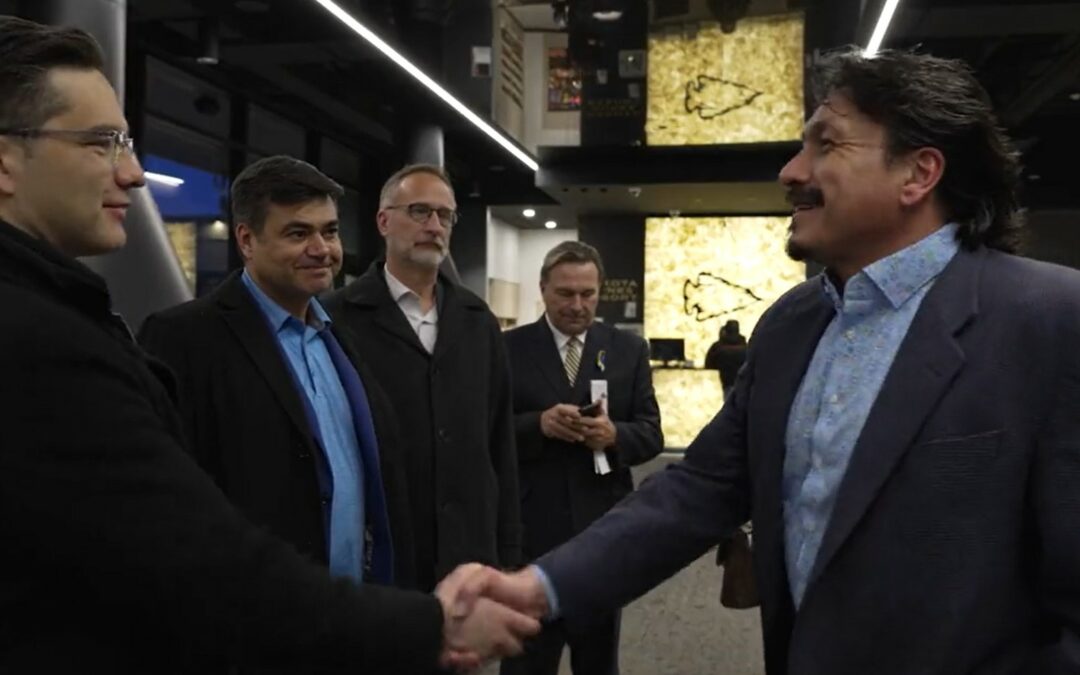Pierre Poilievre is currently embarking on the campaign trail to achieve leadership of Canada’s Conservative Party.
The leadership hopeful was recently in Saskatchewan and made a stop at Whitecap Dakota First Nation south of Saskatoon.
After the visit, Poilievre posted a video to his Twitter feed speaking on the success of Whitecap while walking through the casino, conference centre, and hotel on the First Nation.
“Let’s all take a moment to celebrate (Chief Darcy Bear) and the great potential for First Nations to thrive and achieve things right across this country, with the right policies and a government that is willing to allow them to take back control of their lives and their destinies,” said Poilievre in the video.
MBC News reached out to Chief Darcy Bear’s office to inquire if this was an endorsement for Poilievre’s bid for leadership.
The statement provided by the chief neither confirmed nor denied an endorsement of the Conservative leadership hopeful, but said it was an opportunity to highlight the success of Whitecap. The statement says they were impressed by Poilievre’s willingness to listen and there is an open invitation for all candidates to visit the First Nation.
“Working together with all levels of government has provided our community with positive partnerships and opportunities, and we welcome all candidates to visit Whitecap to listen to our Nation’s story,” read the statement provided to MBC News.
The Whitecap video is one of Poilievre’s most popular postings to Twitter in the past few weeks with over 1100 retweets and over 5000 likes as of Friday morning.
Not an endorsement but a noted political change says expert
Political and Indigenous relations expert Dr. Ken Coates spoke with MBC News saying this video shows a change in the national political landscape when it comes to Indigenous issues.
Coates says having one of the first acts of a leadership candidate for the Conservative Party to connect with an Indigenous community is “life-changing” especially given the party’s contentious history on Indigenous relations.
“Basically it tells you there are no votes to be won in being anti-aboriginal,” he said. “Quite frankly that is a major change in how we see national politics.”
Coates doesn’t see this as an endorsement by Darcy Bear or the Whitecap Dakota First Nation and agreed with the statement provided by the First Nation on their desire to showcase their success on a national level. He believes Chief Bear would extend the same welcome to Justin Trudeau or NDP leader Jagmeet Singh if they were in Saskatchewan.
“It’s not so much a political endorsement as much as ‘we are here to tell our story and if you are going to give us a chance we are going to be with you on this’.”
Coates also believes the video is evidence of a change in the notion that when working with Indigenous people the goal is just to give more federal money.
“(Poilievre and Bear) are basically saying it is time for governments to get out of the way and watch the Indigenous community take over their future in a good and positive way,” said Coates. “I looked at (the video) and thought this is really good news about national politics, the role of Indigenous affairs, and the assumption on what the best future for Indigenous people could be.”
Poilievre’s contentious history on Indigenous issues
There have been moments in Poilievre’s political career that have been contentious with Indigenous people in the country.
In 2008, Poilievre made comments on a talk radio show just before the government’s residential school apology and questioned the compensation package for residential school survivors.
“Native people need to learn the value of hard work more than they need residential schools compensation,” he said on the talk show.
Shortly after he made the comments, Poilievre would publicly apologize for them in the House of Commons.
Coates is glad to see Poilievre understand he needs to get past the rhetoric and language he has used in the past.
“So early on in his campaign he is trying to put that anti-Aboriginal gloss he had over some of his political career behind him,” said Coates.
However, Coates believes a lot of Indigenous people are still going to proceed with caution on Poilievre’s leadership bid.
“Just because you visit one successful community doesn’t mean you are going to be supportive of Indigenous aspirations across the board or that you are going to recognize the government’s ongoing obligation to Indigenous affairs in a major systemic way… don’t take one visit as a sign that the world has gone in a perfect direction.”
Moving forward Coates hopes more Indigenous communities will be highlighted in political campaigns.
“For so many years Indigenous people were ignored, now Indigenous people are seen as a political force and it is about time.”
(PHOTO: A screenshot of the video posted to Pierre Poilievre’s Twitter page.)
